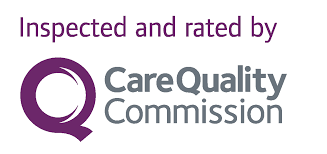Introduction
We can deliver short training courses in our classroom, based at our offices in Redditch. This location is ideal for learners based in and around Birmingham, Solihull, Worcestershire, the West Midlands and Black Country. Being only a few minutes walk from Redditch train station, means non-drivers can use the Cross City line to get to our facilities. If preferred, one of our tutors can travel to your care setting and host a training session with your employees, either on a one to one basis or as a group session. Many of these short courses can also be delivered remotely via zoom platform, allowing learners from further afield to undertake our training courses too.

All our training courses are certificated. Many of our classroom courses use workbooks as an integral part of the learning. Evidence gathered within these workbooks can be used and linked to our accredited qualification programmes, should a learner choose to go on and study further with us. Therefore, these training courses may lead to an externally certified qualification.
These short training courses are delivered in a single day, except for Statutory and Mandatory Induction Training which is usually delivered over a minimum of 2 days.
Please contact us for our latest offers for these courses.
General Information regarding delivery of our training courses
Click this button below to read about how these courses are delivered, what to expect, and general information about what to wear and bring to your training session.
A number of our classroom-based training courses are aligned to Skills For Care Core Skills Training Framework. More information on this can be found here Skills for Care Core Skills Training Framework website
Basic Life Support
This course covers the following topics - Assessing an incident and a casualty, CPR for adults children and babies, Use of an Automatic External Defibrillator, The recovery position and major causes of unresponsiveness, Choking, Keeping yourself safe and anaphylaxis
This course is not just relevant to all care workers, supervisors and management, but also for any individual working in any industry or business sector. It is a mandatory training course for all care workers.
Care Planning
The course covers the following topics - what is a care plan?, types of assessment, person centred thinking and planning, outcome based planning and review and updates to care plans.
The course is relevant to all carers.
Catheter Care
This course is ideal for those care workers who may have clients or service users who require the use of a catheter. This course covers the following topics:: What is a catheter and why they are needed, Common types of catheters, Night bags, leg bags, taps, and valves, Understanding catheterisation, Care of a catheter, Infection control, Common problems associated with a catheter, Record keeping.
Conflict Resolution
This course explores how to de-escalate situations and equip a learner with the necessary skills to diffuse the potential for harm. Many refer to this course as Positive Behaviour Support. Following completion of this course, learners will be able to describe the common causes of conflict and identify the different stages of conflict, learn from their own experience of conflict situations to develop strategies to reduce the opportunity for conflict in the future, Understand the impact that cultural differences may have in relation to communication, Identify the causes of communication break down and the importance of creating conditions for communication to succeed. This course has been aligned to the Skills for Care Core Skills Training Framework and certification lasts for 3 years.
Dementia Awareness
The course covers the following topics - the neurology of the brain and how dementia affects it, the types of dementia and how they manifest, how to communicate in dementia care, applying person centred approaches in dementia care and equality, diversity, and inclusion with those with dementia.
The course is particularly relevant to those carers who mayinteract with individuals who have or may acquire dementia.
Dementia Care
The course covers the following topics - an introduction to dementia and working in dementia care, the different models of dementia, communication techniques in dementia care, applying person centred approaches in dementia care, equality, diversity, and inclusion with those with dementia and the types of medication and medication administration in dementia care.
The course is particularly relevant to anyone who wants to learn about dementia and potentially progress into a care worker role.
Diabetes Care
This course is ideal for any carer worker who may come into direct contact with clients or service users who have either Type 1 or type 2 diabetes. The training courses covers What is Diabetes, What is Type 1 and type 2 Diabetes, Other types of Diabetes, Diabetes remission, Sign and Symptoms of Type 1 and Type 2 Diabetes, Why symptoms occur, Risk factors for Type 2 Diabetes, Prevalence rates, Health complications from having Diabetes, Hyperglycaemia - signs and symptoms and treatment, Ketoacidosis, Hypoglycaemia - signs and symptoms and treatment, Managing Type 1 Diabetes and Diabetes technology – insulin pumps, Continuous Glucose Monitors, Finger prick testing, Smart injector pens, Sick day rules for those with Diabetes, Understanding healthy eating and nutrition, Expected responsibilities of a care worker
Emergency First Aid at Work Level 3
All employers must ensure adequate employees are trained in First Aid; this is mandated in the Health and Safety (First Aid) Regulations 1981. This one-day 6-hour course is externally certificated by Highfield Qualifications and covers knowledge such as the roles and responsibilities of the first aider and how to assess an incident. The qualification also covers competency first aid skills in CPR and the use of an AED, providing first aid to a casualty who is choking and dealing with external bleeding and hypovolaemic shock. We can take up to 12 learners at a time on this training to allow all attendees adequate opportunity to demonstrate their competency skills attained to the assessor.
End of Life Awareness
The course covers the following topics - understanding perceptions of death and dying, aims, principles, and policies of end of life care, communication in end of life care, an introduction to Advanced Care Planning, services in end of life care, the support structure in end of life care and preparing a body after death.
This is a very sensitive training course. Tutors are on hand throughout to support attendees who may find areas of the course difficult to deal with.
The course is relevant to all carers dealing with adult Health and Social Care.
Epilepsy and Seizure Awareness
This course covers the following topics - What is a seizure, and the causes of seizures including epilepsy, Signs, symptoms and diagnosis, Common triggers, Managing a seizure, Phases of a seizure, Anti-seizure medication and emergency (Rescue) medication, the Buccal route for administrating medicine and When to call 999.
This course is relevant to all care workers or any individual who may come into contact/cares for an individual who has epilepsy or seizures.
Equality, Diversity and Inclusion
This course covers the following topics - What are equality, diversity, inclusion, and discrimination? Relevant legislation – including the Equality Act 2010 and the 9 protected characteristics, Direct and indirect discrimination, Effects of discrimination, Challenging discrimination, and Inclusive practices.
This course is relevant to any employee working in any kind of industry or business sector. This course is aligned to the Skills for Care Core Skills Training Framework.
Fire Marshal
Open to any organisation - not just the care sector and is a legal requirement under the Regulatory Reform (Fire Safety) 2005 that stipulates at least one member of staff must be adequately trained., although companies must ensure sufficient numbers of trained staff are on duty for each working shift pattern. This course covers Primary causes of fires starting, What is a fire marshal and fire warden, Legislation, Specific tasks and duties a fire marshal will undertake, Emergency Planning, Fire induction requirements for visitors, employees and residents, PEEPs, Human behaviours when hearing fire alarms, How fires spread, Preventative measures, Classes of fires, The 5 types of fire extinguishers – Water, Powder, Foam, CO2 and Wet Chemical and how to use them, Use of fire blankets, Evacuation strategies, Fire signage, Fire procedure for care homes, a practical Fire drill competency check
Health and Safety
The course covers the following topics - Legislative framework, Roles and responsibilities for Health and Safety, Risk management, Accidents and incidents, Hazardous substance control, Fire and evacuation procedures, An introduction to infection control, and Ensuring your own health and safety.
This course is relevant to any employee from any industry or business sector where individuals are seeking to expand their knowledge on Health and Safety in a workplace. This course is aligned to the Skills for Care Core Skills Training Framework.
Infection Prevention and Control
This course covers the following topics - types of micro-organisms and the diseases they cause, the chain of infection, sources and transmission modes of infection, poor practice that support the spread of infection and ways to prevent and control the spread of infection.
The course is relevant to all front line care workers. This course is aligned to the Skills for Care Core Skills Training Framework Level 1.
Learning Disability and Autism
This course can be delivered by Zoom platform or as a classroom based session. This course covers the following topics -The Learning Disability Framework, Understand the difference between Learning Disability and Learning Difficulty, Recognise signs and symptoms, Understand how to ensure effective communication in the care of Learning Disability, Know about the medical and social models of disability, Understand the importance of equality and inclusion and reasonable adaptations
Medication Administration and Handling
The course covers the following topics - the legislative framework, types of medication and the classification, supply, storage and disposal of medication, safe administration – the 6 R’s including forms of medication, administration routes and aids including the buccal route, side effects and reactions, records and reporting, STOMP pledge for care workers.
This course is relevant to all care workers who come into contact with individuals who require medication.
Mental Capacity Act 2005
This course covers the following topics - An introduction to the Act, and the latest update, The 5 principles, Assessing mental capacity, Presumption of capacity, Assessing mental capacity, Unwise decisions and best interest decisions, Protection for workers, Liberty Protection Safeguards, Restrictive practice and restraints, The act in practice – using the Code of Practice.
This course is relevant to all care workers, supervisors and management roles in care.
Mental Health
Mental Health training is vital to allow management and colleagues of all levels to help support individuals who may be suffering with Mental Health conditions. It is open to any organisation, not just the care sector. This course covers What is mental health, Emotional, social and psychological well-being, Causes of mental health, Depression signs, symptoms and causes , Anxiety signs, symptoms and causes, Panic attacks, Obsessive Compulsive Disorder (OCD), Post Traumatic Stress Disorder (PTSD), Eating disorders, Self-harm signs and symptoms, Psychosis, bipolar and schizophrenia, Suicidal feelings, How to support a client with mental health conditions
Moving and Handling and Safe Repositioning of Individuals
The tutor will cover the relevant legislation related to moving individuals, along with the anatomy and physiology of the body. The principles of safe handling of objects and people, risk assessments, and aids and equipment are also covered. This training has practical assessments to check competency.
The course is particularly relevant to those carers who may be required to move individuals with limited mobility. This course is aligned to the Skills for Care Core Skills Training Framework Level 2.
Oliver McGowan Mandatory Training in Learning Disability and Autism
The new Regulation in The Health and Care Act 2022 says "From 1 July 2022, all health and social care providers registered with CQC must ensure that their staff receive training in how to interact appropriately with people who have a learning disability and autistic people, at a level appropriate to their role" and this applies to all health and care staff as well as ancillary staff who may have contact with people with a learning disability and autistic people, such as administrative staff. The Oliver McGowan Mandatory Training is the standardised training that was developed for this purpose and is the government's preferred and recommended training for health and social care staff. Training is delivered remotely via the zoom platform and is co-delivered by two trainers with lived experience of learning disability and autism This allows all attendees to gain vital first-person perspectives on living with a learning disability. We are a Tier 1 approved provider which is for individuals who require general awareness of the support autistic people or people with a learning disability may need.
Person-centred Care working with Autism
The course covers the following topics - understanding the spectrum, recognising the symptoms that those on the spectrum may display, the triad of impairments, communication in autism care, including language and intellectual ability, sensory and perceptual issues, managing behaviour and applying person centred values
The course is particularly relevant to care workers working with people on the autistic spectrum or care workers wishing to progress into a role that requires this type of specialist knowledge.
Parkinson's Awareness
Ideal training course for all care workers who may interact with clients or service users who have a diagnosis of Parkinsons. This course covers What is Parkinson’s, Factors that cause Parkinson’s, Prevalence rates and life expectancy, How carers can offer support to those with Parkinson’s, Idiopathic Parkinson’s, Vascular Parkinsonism, Drug-induced Parkinsonism, Managing face masking, Signs and symptoms, Medication, therapies, and treatments, Where to find additional resources for help
PEG feeding
Percutaneous Endoscopic Gastrostomy (PEG) Feeding is an ideal training course for carers with responsibliity to administer and care for individuals who require PEG feeding. This course covers What is external feeding and how do we achieve it, Why might external feeding be needed, Common medical conditions often associated with the need for PEG feeding, Relevant legislation to be considered, How to set up and use a PEG feeding system, Equipment required, Gravity feeding, Pump feeding, Troubleshooting and Routines and records
Promoting Independence
All carers should be aware they have duties to support and promote independence for the individuals they are entrusted to care for. This course explores what is meant by independence, ,Arriving at a new client's home, Managing infection with vulnerable clients, Good communication skills, Person-centred values and approaches, Promoting independence, Supporting personal care and Records and reporting
Refresher and Overview Training
The care sector requests that all carers undertake mandatory refresher training in order to keep up to date with the latest legislation, care skills, competency and knowledge. Upon completion, all attendees will be able to demonstrate knowledge in the areas of Code of conduct, Duty of care, Duty of candour, UK GDPR, Confidentiality and Documentation, Equality & Diversity, Safeguarding, Person-centred care, Communication, Health and Safety, Assisting with mobility and Basic life support and in addition, further demonstrate competency by practical assessments in the areas of Assisting with mobility, Infection control and Basic Life Support
Risk Assessor Training
This training course is suitable for those individuals in an organisation who are responsible to assess, create and review risk assessments in the workplace. This course covers Understand why risk assessments are necessary for maintaining and improving standards of health and safety at work, Learn the principles of risk assessment, Complete a range of risk assessments and Consider how to ensure that risk assessments are dynamic
Safeguarding and Protection
The course covers the following topics - what is safeguarding and protection, the underpinning legislation and guidance, the six principles of safeguarding, types of abuse and how to recognise them, challenging behaviour and restrictive practices, responding to concerns, the roles of all concerned in safeguarding, practices that reduce the likelihood of abuse, online safety and whistleblowing.
This course is relevant to all care workers and any employees who has responsibility for the safety and protection of children and adults regardless of the care setting. This course is aligned to the Skills for Care Core Skills Training Framework Level 1.
Statutory and Mandatory Induction for new employees
Skills for Care have published new guidance on statutory and mandatory Induction training, which are both key aspects of any care worker induction.
Statutory training for care workers is training that is required by law or by a statutory body, such as the Care Quality Commission (CQC) or Ofsted, in order to ensure care providers and their workers are meeting legal requirements.
Mandatory training refers to training that is compulsory based on local or national policies and government guidelines to ensure that staff know how to work safely.
We deliver the new Skills for Care Statutory and Mandatory Induction training programme and offer care organisations the option to bolt-on additional training modules to boost further their Statutory and Mandatory Induction training. Please get in touch to discuss your specific requirements.
Stoma Care
This course is ideal for those care workers who may come into direct contact with clients or service users who have a stoma. The course covers the following topics: What is a stoma and why they are needed, Common types of stoma, Understanding colostomy, Why a colostomy is needed, Understanding Ileostomy, Why is an Ileostomy needed, Understanding Ileo anal pouch, Understanding Urostomy, Understanding reversal, Problems that can occur with a stoma, Resources, appliances and equipment for stoma care including pouches, adhesives, flanges, deodorants, filter caps and stoma caps, Role of a carer in stoma care , Waste disposal, Infection control, Healthy eating and diets
Stroke Awareness
This course covers the following topics - What is a stroke? How a stroke affects the body, Differences between a stroke and a TIA, Signs and Symptoms, Key stages of a stroke, Stroke prevalence rates, Risk reducing factors, How to deal with an individual having a stroke, High blood pressure and the elderly, Stroke care management, Where to find additional resources for help.
This course is relevant to all care workers and others who may come into contact with individuals who have had a stroke or are at a greater risk of having a stroke.
Wound Care
From time to time, carers may need to assist with wound care, especially if their clients or sevice users are long-term bed-bound. This course covers What is a wound, The physiology of skin and its primary functions, What causes wounds, What are pressure wounds, Where pressure wounds occur on the body, Why pressure wounds occur, Stages 1,2,3,4 and undeterminable staging of pressure wounds, Treating pressure wounds at each stage, Who is at risk of developing pressure wounds, Delegated wound care management, Infection prevention , Other types of wounds
if you are interested in undertaking any of our short courses, please make an enquiry on our How to Enrol page or send an email to info@stepuptrainingandcare.co.uk






